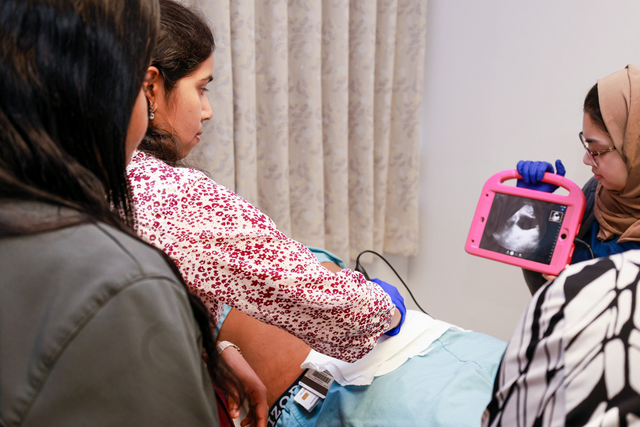UAB Sets Milestone: Equips All Medical Students with Portable Ultrasound Units for Enhanced Learning
For the first time, every student at the University of Alabama at Birmingham Marnix E. Heersink School of Medicine has access to a portable point-of-care ultrasound unit — or POCUS unit— thanks to $2 million in federal grant money awarded to the Department of Family and Community Medicine. UAB is one of the first medical schools in the United States to grant each of its medical students access to these devices.
Meet the “stethoscope of the future”
Unlike the dedicated machine on wheels wielded by technicians in labor and delivery units or hospitals, a POCUS unit is meant to fit in a clinician’s pocket and connect to a tablet or smartphone to visualize the results.
“Clinicians can use handheld ultrasound to evaluate almost every major organ system and better visualize suspected pathology,” said Steven Brown, M.D., assistant professor in the Department of Family and Community Medicine. “Some have even called it the ‘stethoscope of the future.’”
“POCUS could be particularly helpful in caring for patients in rural and urban underserved areas, who already face significant wait times for appointments or must travel long distances for medical care,” said Irfan Asif, M.D.
That is why, this fall semester, every student in the Heersink School of Medicine was granted access to a POCUS unit.
“UAB is one of the only medical schools in the United States that offers an integrated, longitudinal POCUS curriculum with an emphasis on promoting primary care and improving the care of the medically underserved,” Brown said.
In addition to the 600 devices for medical students, the POCUS Initiative includes 100 units for the community preceptors who teach UAB medical students in their clinics. The preceptors will use the units to identify soft-tissue infections, fluid accumulation in the joints and abdomen, gallbladder disease, kidney stones, heart failure, dehydration, and more. The department will educate and train residents and faculty, as well as medical students.
POCUS in rural and urban underserved areas
“POCUS could be particularly helpful in caring for patients in rural and urban underserved areas, who already face significant wait times for appointments or must travel long distances for medical care,” said Irfan Asif, M.D., chair of the Department of Family and Community Medicine, associate dean for Primary Care and Rural Health, and director of UAB’s primary care service line.
The Department of Family and Community Medicine’s Comprehensive Urban Underserved and Rural Experience, or CU2RE program, made the POCUS Initiative possible. CU2RE was created through a $7 million grant from the federal Health Resources and Services Administration in 2020 to recruit, train and retain medical students interested in primary care and committed to serving in rural and urban underserved areas of Alabama. The goal is to mitigate the projected shortfall of 447 primary care providers in Alabama by 2030.
 POCUS could be particularly helpful in caring for patients in rural and urban underserved areas.Primary care doctors use handheld ultrasounds to better serve their patients
POCUS could be particularly helpful in caring for patients in rural and urban underserved areas.Primary care doctors use handheld ultrasounds to better serve their patients
“With handheld ultrasounds, a health care provider could determine whether a soft-tissue lesion is an abscess or a cyst or a lipoma or a mass, each of which would require different treatment decisions and follow-up tests,” said Erin DeLaney, M.D., vice chair for Clinical Care and Quality of UAB Family and Community Medicine – Highlands.
DeLaney says physicians can also use the POCUS unit to determine whether a patient has a torn tendon, examine the gallbladder for stones or look at the heart to determine how well it is functioning — all of which could be done without having to send patients out for additional tests and referrals.
“The future of medicine, especially primary care in rural and underserved areas, will require physicians to be nimble, meet patients where they are and find efficient ways to address a wide variety of concerns right there in clinic,” Asif said. “Point-of-care ultrasound offers a great way to do that, especially in rural areas with less access to major hospital systems or other points of care.”

